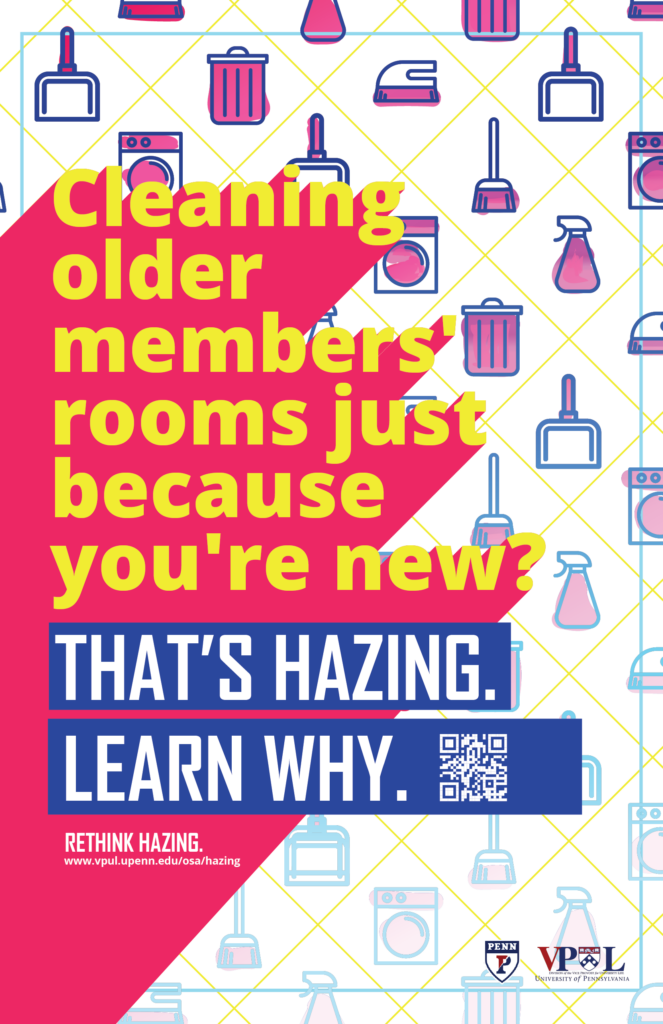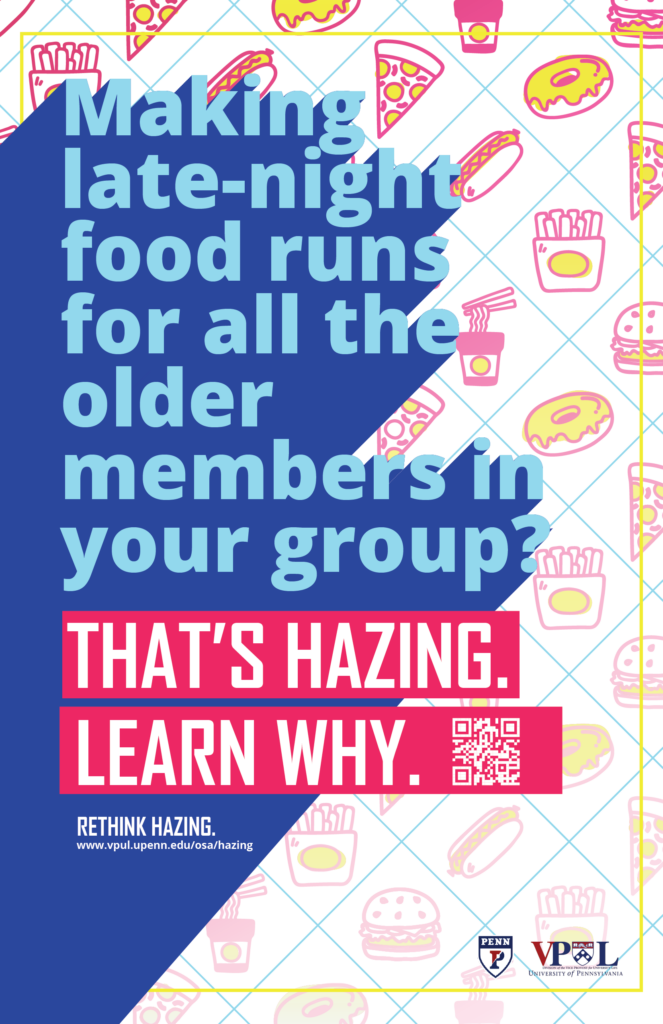Hazing often occurs within groups. At Penn, hazing is most often perpetuated by student organizations. Unfortunately hazing undermines Penn’s efforts to create a community based on mutual respect and personal well-being. Within this website faculty, staff, students and alumni will find education on hazing, resources to report hazing concerns, and best practices for organizations interested in improving their organizational culture.
What is Hazing?
There are many different definitions of hazing which exist within the Penn community. Many people assume that if an activity has willing participants and will not be fatal that it does not count as hazing. That is incorrect. Much of hazing comes down to issues of power and exploiting that dynamic within a student organization. This definition from HazingPrevention.org is a good reference to increase understanding of this nuanced issue:
Hazing is any action taken or any situation created intentionally that causes embarrassment, harassment or ridicule and risks emotional and/or physical harm to members of a group or team, whether new or not, regardless of the person’s willingness to participate.
Reporting Hazing Concerns
Whether you have witnessed an act of hazing, heard friends/students discussing a concerning activity or have participated in hazing yourself, there are several ways you can make the University aware. Any reports made should be as detailed as possible.
There are distinct differences depending on where you choose to take the information you have. Confidential resources can listen to your account and counsel you on next steps. They will not reveal your identity unless given express permission by you. Non-confidential resources can give counsel/advice on next steps. However, should these offices become aware of information that requires University intervention, they are compelled to follow up. Finally, Formal Complaints, which have no promise of confidentiality, can be filed by individuals or groups who are ready to engage in an identified University process to determine responsibility around issue of hazing.
Confidential Resources
Office of the Ombudsman – The is a formal University resource for all community members specifically intended to counsel you on options and resources which exist within the University community.
Office of the Chaplain – Individuals and organizations may find great help in seeking guidance from the Office of the Chaplain. This resource is intended to counsel and guide you through your next steps.
Non-Confidential Resources
Office of Student Affairs – If you are part of a registered student organization or are a community member looking to report a concern with a non-Greek group, the OSA may be a good place to start.
Office of Fraternity and Sorority Life – Concerns regarding Greek letter organizations can be shared directly with OFSL.
*Academic Advising offices, Cultural Resource Centers and any other faculty or staff who act as advisors to organizations are also wonderful resources to explore these issues and provide guidance.
Formal Complaint
Center for Community Standards and Accountability – The University’s official entity to handle formal complaints about group or individual behavior in relation to the code of conduct.
Best Practices to Improve Organizational Culture
Hazing is frequently perpetuated by the idea of “tradition”. Groups often say “we’ve always done this” or “I/We had to do it, so you/they have to do it”. Changing those traditions and stopping those cycles can seem daunting, if not impossible. It can be difficult work, but it is the right thing to do if you want to ensure a healthy, safe, responsible and supportive experience for your friends.
The first thing you can do is honestly consider the activities your group engages in and determine if they constitute hazing.
Ask yourself the following questions:
- Would I be willing to describe the activity to my parents, grandparents, professors, advisors or police?
- Would I be concerned if a video of this activity were to be made public?
- Do I harbor ill will about having to participate in this activity in the past?
- If I asked a more senior member in the group to do this, would they?
- Have we had to determine a detailed communication plan to make sure everyone stays safe during this activity?
If you answered “yes” to any of these, there is a good chance you are hazing your members.
Campus Trainings and Resources:
While it may not always seem obvious, much of what you learn in a number of other campus trainings is pertinent to your ability to recognize and intervene with issues of hazing. Participating in any of the following will improve skills associated with making these tough decisions:
- Schedule a PAVE workshop for your organization.
- Participate in iCare training to learn how to support peers in distress.
- Complete SAVA training to learn how to identify and intervene on issues of personal and sexual violence.
Start Talking About Hazing:
Visit the Clery Center’s We Don’t Haze resource, view the video and facilitate the accompanying discussion prompts.
Watch the University’s “Rethink Hazing” video and facilitate a conversation within your organization.
Have an honest conversation among your group leadership about your group’s traditions. Consider their purpose and objectively discuss the value they add to your organization.
Reach out to your student group advisor, coach of your team, or the Office of Student Affairs to discuss ways to create new and exciting ways to engage and welcome your new members.
Rethink Hazing Campaign
Hazing is often justified by groups because they believe their activities are not as bad as hazing activities in which other groups participate. What many students don’t consider is that virtually no one starts hazing their members in extreme ways from the start. These are activities which grow from year to year and build a tolerance within the organization for riskier and more problematic behavior. The posters below highlight activities common at Penn which may seem harmless but do little to encourage true bonding or team development. These activities also do little to build a member’s skills to make them a better contributor to the group. Most importantly, being “on call” can result in lack of sleep, an inability to shake minor illness and may even be triggering for some members based on their lived experiences. Ultimately, consider how your membership practices support the overall wellness of your members, an issue Penn students have very clearly articulated as a value in our community.
"That's Hazing. Learn Why." Poster Campaign


